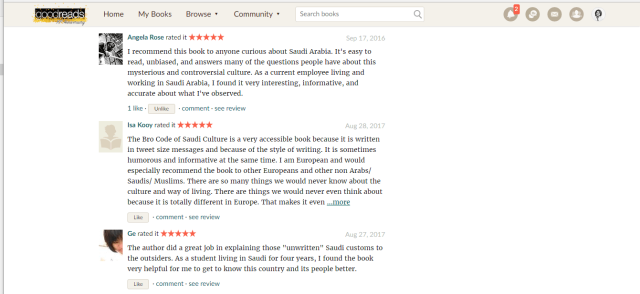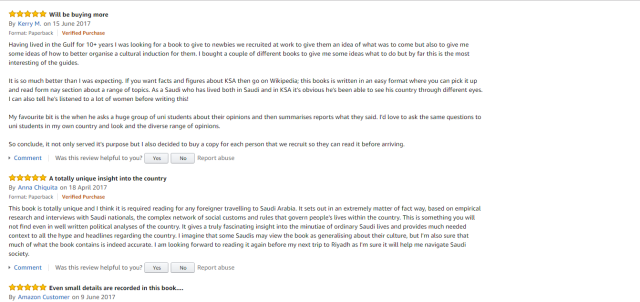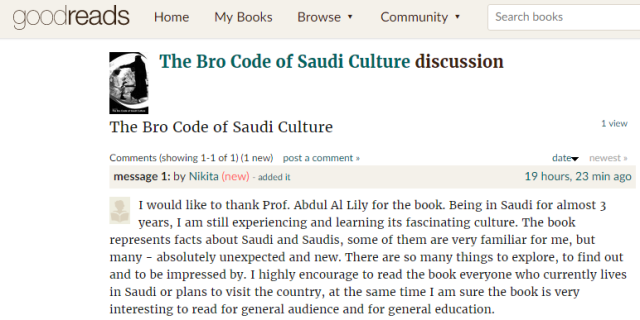
Alarabya
Dr. Abdul Al Lily, an Oxford graduate and an assistant professor at King Faisal University launched ‘The Bro Code of Saudi Culture’ last year. It is his first book and the first to be published in English, Spanish and soon Chinese. It is an Amazon bestseller. It has been talked about in different languages and by magazines, journals and newspapers. It is recommended by international institutions such as the University of Manchester and by known figures, like Dr James M. Dorsey (Journalist) and Caroline Montagu (Business Woman). Last month, the book was sold out twice at the Riyadh International Book Fair.
Saudi Gazette caught up with the Saudi author to discuss the book:
SG: Can you talk us through your book? What can the readers expect? How can it help them?
AL: This book sets out a series of rules meant as guidelines to live by and behave properly among Saudis and/or to understand their culture. Most of these rules have long been unwritten and only verbally communicated among Saudis. As a result, visitors to Saudi Arabia have been unable to follow these rules appropriately. Those interested in Saudis or their civilisation have neither understood nor recognized these rules. For such reasons, these rules need to be spelled out in bold print.
My book has been written to respond to this need, as well as to inform a broad audience on the nature of gender roles and relations in this country. Every culture is governed by an internal code of conduct, and this book offers the first written code of Saudi society. It is the product of close observations of daily activities and more than 2,000 interviews with nationals and residents over the past four years.
This code shows 2030 tweet-sized (often previously unrecorded) explanations of how the human body acts in Saudi Arabia. It covers everything from top to bottom; the face, eyes, ears, mouth, waist and extremities. This code must be carefully considered if one wishes to stay within the circle of Saudis.
SG: What are the interesting components in it? Has your marriage to a Westerner influenced your thoughts on Saudi culture?
AL: The book is the first to talk about Saudi culture in a purely descriptive (and thus non-judgemental and unbiased) manner. It is the first to be written by a Saudi who was born and raised in Saudi Arabia, who is still based in this country, who is a former formally-recognized imam and who comes from a working-class family — yet has traveled the world, is married to a non-Muslim European, studied in Oxford, published with the largest international publishers and hence has the ability to communicate with foreign mentalities. It is the first to present Saudi values and norms in the form of a bullet-pointed list and in tweet-sized explanations.
My marriage to a non-Saudi, non-Arab and non-Muslim has made me more able to reflect on my own culture and to compare my own Saudi, Arabian and Muslim background to those non-Saudi, non-Arab and non-Muslim cultures. My wife and my many non-Saudi friends and interviewees help me a lot see things in Saudi culture that I could not see before because I was taking them for granted. These people helped me raise my awareness of Saudi norms. I was writing in the book any Saudi norm or practice that these people raised my awareness of. This is why one reader of the book wrote: “Unique that an Arabic man is critical looking at his ‘own kind’ in the Arabic world”.
SG: Do you have a target audience? What motivated you to write this book?
AL: The book is written to serve three types of people. First are non-Saudis. Non-Saudis who concern themselves with Saudi culture are stuck in a loop, rehashing the same issues of Saudi culture over and over again. This book drags the international discourse out of this rut by drawing attention to other issues and therefore showing that Saudi society goes beyond those issues that have already been commonly talked about in the media.
Most traditional Saudi norms and values, beyond these rehashed issues, remain obscure to non-Saudis, having been left essentially untouched and unaffected by liberal ideologies over the last few centuries. Those obscure issues have passed unnoticed by researchers and have slipped under the radar of the international media. Therefore, there is a need to expose all of the norms and values within this culture to the outside world, providing a detailed description of those norms and values. The current book provides such a description.
Second are Saudis. This book presents to Saudis their own tradition in a written form, thereby increasing their awareness of their culture and their self-awareness. Seeing something is different from reading about it. That is, although a person may not notice what he or she sees and is exposed to during daily life; he or she is more likely to notice it when it is presented to him or her in a written form. Through this book, I wish to help Saudis notice the taken-for-granted and thus overlooked aspects of their social life.
Third are future Saudis. This book documents current Saudi culture for future generations. Sooner or later, Saudi tradition will cease to be a part of the modern world and will become history. Therefore, there is a need for a descriptive account that captures this lifestyle before its citizens move on, and before its unique norms and values vanish. This volume offers such an account.
Previous generations were not good at recording Saudi tradition. Hence, most information about past Saudi culture was either not well recorded, or it has been lost, meaning Saudi history is not fully known to current Saudis or to anyone interested in this subject.
SG: How has the readers’ response been so far?
AL: Non-Saudi readers have left positive feedback about the book in Amazon.com, goodreads and other venues. Some shared their enthusiasm about the book in person or via private messages. One, for example, said: “Your book is something that takes you from ‘oh ok, it makes sense’ to ‘omg, are you serious!!!”’ Another said: “I read the whole book in one night! It’s a fascinating read”. Another wrote: “I have online friends from Saudi and they expected it to be inaccurate but did, in fact, confirm everything I quoted to them”.
One reader wrote: “For the first time I have found in writing all the verbal norms ruling the country”. Another reader thinks that the book “gives a glimpse of Saudi Arabia you don’t get though the news”. One reader thinks that the book is “easy to read, unbiased and answers many of the questions people have about this mysterious and controversial culture”.
On the other hand, most Saudi readers did not like the book, partly because they did not like their culture to be documented. Normally, Saudi nationals do not like their tradition to be documented, especially when this documentation takes place in a foreign language, partly because they do not want to be subjected to criticism by the outside world. They feel this culture has been subject to ongoing, harsh and, most of the time, unfair criticisms by others. They think that it is not the business of other cultures to dissect Saudi culture.
The book is explicit about Saudi practices, although Saudis normally do not like to be explicit about their cultural issues and matters and do not like to open up to the outside world the closed nature of their tradition. Despite this dissatisfaction of these Saudis with the intention behind the book, most of them think that the explanations of Saudi culture provided by the book are accurate and reflect the reality. For example, one reader wrote: “I’m Saudi and it was so fun to read! Laughing and going ‘Yeah, we do that’ was a constant feeling throughout the book.” Another Saudi wrote: “Hilarious book with truths”.
SG: What was the response at Riyadh International Book Fair?
AL: I spent 48 hours at the book fair, standing next to my book, talking to those who were interested. Actually, Saudi female readers (who skipped through the book) tended to disapprove of it. They did not like the book because they thought that I wrote it with a West-oriented intention of changing the current status of Saudi women. They reported being happy with the current status of Saudi women.
Male potential readers tended to be supportive of the book. Many of these men bought more than one copy to give as a present to their male and female non-Saudi friends. Some potential readers criticized the book for exposing both negative and positive practices of Saudi society. They said that I should have talked about only positives, without reporting negatives. Some critics repeated the widely common maxim, “Say something useful, or be silent”, stressing that there is no point of reporting certain Saudi practices because such reporting is “useless”. Some critics think that the book is intended to distort the reputation of Saudi culture at the international level.
SG: What do you think about the literary scene in Saudi Arabia?
AL: Saudi Arabia is in need of qualitative academics and anthropologists, who are Saudi, born and raised in Saudi Arabia and interested in hearing and recording the voices of those working-class and lower-middle-class Saudi men and women who are normally disregarded by the global media (which have a bias toward the opinions of Saudi activists and elites). There is a lack of English-language writings by Saudis on Saudi culture.
Saudi academics tend not to have a strong linguistic and communicative fluency and the liberalism that enables them to communicate with an international audience and to depict their tradition without being defensive or biased. Many Saudi writers and commentators lack the ability to speak the language of an international audience.
Non-academic publications by Saudis and directed to the outside world tend to be either written in a self-protective and politically oriented way or written by Saudis who may not have the ability to communicate with Westerners’ ways of seeing the world.
Publications on Saudi culture in the market have mostly been written by non-Saudis. Writings about Saudi culture by Saudis are normally driven by underlying political agenda and written defensively, with the authors apparently trying very hard to show the outside world that Saudi Arabia has a good society and that its reputation has been distorted.
The current book addresses this bias by being entirely descriptive, thereby imposing on the reader no political views or directing his/her way of seeing Saudi tradition.
Even in Arabic, the practice of documenting Saudi tradition is weak, because documentation is in general limited in Saudi Arabia. What Saudi writers normally care about is to write not about their society but rather for their society, i.e. to write not about what their society has actually done but rather about what their society should ideally do and should have done.
SG: Are you currently working on any new project or do you have plans to launch a new book in future?
AL: In future, I would like to see another book written in English by a Saudi woman, entitled “The Sis Code of Saudi Culture”. I am currently working on the sixth edition where I incorporate the input I have received from Saudi and non-Saudi readers and where I am conducting more interviews to capture and record more descriptions of Saudi norms and practices.
For the source, click HERE.




